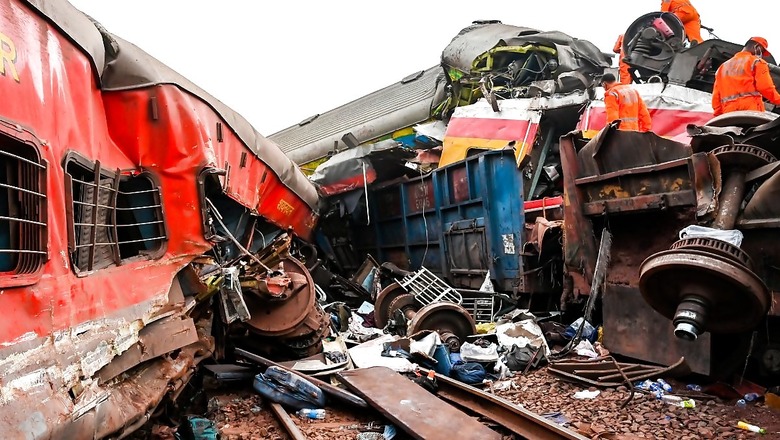
views
Any contractors involved in digging work can be fined at least Rs 1 lakh if they work without permission or resort to careless working without making arrangements to protect Signalling, Electrical and Telecommunication cables and other utilities, the Ministry of Railway said in an order.
The Ministry order, about the procedure for undertaking digging work in the vicinity of Signalling, Electrical and Telecommunication cables, was issued for the first time after 2013 and came days after the Balasore triple train crash that killed at least 290 people.
As per the rules, in case only a quad or signalling cable gets damaged, the fine will be Rs 1 lakh. For damage to only optical fibre cables, the fine will be Rs 1.25 lakh. And for damage to both optical fibre cables and quad cables, the contractors will have to pay Rs 1.5 lakh. In case of damage to an electrical cable, the fine will be Rs 1 lakh.
The order, seen by News18, also reads that based on the local conditions and practices, the zonal railway should devise its own conditions for examining and levying penalties.
The zonal railways have also been directed to ensure that these local instructions and guidelines are made part of all tenders for works in the vicinity of cables.
“For each cable cut, a joint report at the level of supervisors should be prepared on the same day and it should become the basis for levying penalty and fixing responsibility. Joint note should be forwarded to the executive in-charge of the work,” it reads.
The Ministry has also said that the executive in-charge of the work should act and decide on the cable-cut case within 15 days and there will be a provision of appeal by contractors within one month of notice for levying penalty at Additional Divisional Railway Manager (ADRM) level.
“Decision of ADRM shall be final and binding upon both parties,” the Ministry said.
According to the last order, issued in 2013, a Joint Procedure Order (JPO) for undertaking digging work in the vicinity of underground Signalling, Electrical and Telecommunication cables was listed.
“In spite of the provisions contained in the JPO for protection of cables, a significant number of cable-cut incidents and practical difficulties in implementation of certain provisions of the JPO were reported and so the Board came up with these new guidelines. Also, these guidelines are in supersession of the JPO,” a Ministry official told News18, requesting anonymity.
As per the new rules, cable route marking for all types of cables must be made available block section-wise on Railnet and before allowing the contractor to work near the tracks, the work executing agency should ensure that the permission is granted by the division to the contractor in accordance with the local instructions to work in the vicinity of the cables.
Zonal railways are also directed to devise suitable mechanisms and timelines for obtaining/granting such permission.
“In case of work being taken up by the state government or national highway authority, zonal railways should devise mechanism for shifting the cables or for proper protection of cables before granting permission to work,” it added.
Last week, the Commissioner of Railway Safety (CRS) submitted its report about the investigation of the train accident in Balasore. As per the inquiry, one of the main reasons behind the mishap was the wrong labelling of wires inside the level-crossing location box. This led to a mix-up during maintenance work.
On June 2, a train accident took place in Odisha’s Balasore that killed over 290 people and injured more than 1,000 people. Three trains, including two passenger trains, were impacted in the crash.
















Comments
0 comment